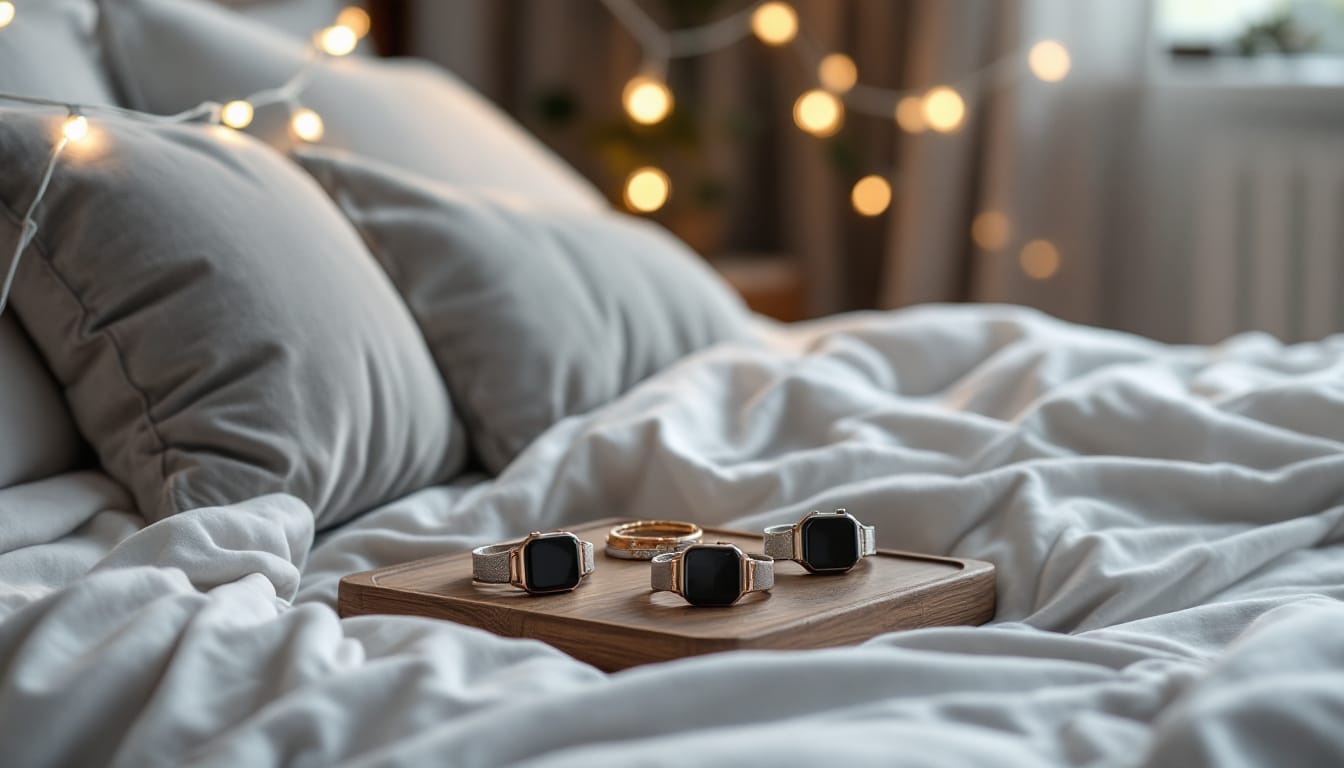Imagine waking up every morning feeling refreshed and energized, ready to seize the day! Well, the secret to achieving this may lie in the realm of smartwatches and fitness bracelets that promise to revolutionize your nightly rest. No longer mere accessories to count steps, these innovative devices are now powerful tools designed to track and enhance your sleep quality. With sophisticated sensors and data analysis capabilities, they can provide valuable insights into your journey through sleep cycles, heart rate, and even environmental factors that may disrupt your tranquility.
As we grow increasingly aware of the impact that good sleep has on our health and well-being, the question arises: can these gadgets truly serve as reliable allies for our nightly rejuvenation? From sleep scores to personalized recommendations, smart devices are pushing the boundaries of how we understand rest. In this exploration, we will delve into the fascinating world of sleep monitoring technology, examining its benefits and limitations, and uncovering whether smartwatches and bracelets can indeed become our best friends in the quest for a better night’s sleep.

In an era where technology touches nearly every aspect of our lives, the integration of smart devices into our health and wellness routines has become increasingly prominent. Among these devices, smart watches and fitness bracelets have surged in popularity, particularly for their potential benefits in tracking and improving sleep patterns. These devices not only monitor physical activity but also provide valuable insights into sleep quality, offering users the ability to turn quantifiable data into actionable strategies for better health.
Table of Contents
ToggleUnderstanding the Impact of Sleep on Overall Health
To appreciate the value of smart devices in sleep optimization, it’s essential to first understand the critical role that sleep plays in maintaining overall health. According to recent statistics from the Centers for Disease Control and Prevention (CDC), approximately one in three adults do not get enough sleep regularly. This lack of sleep is associated with a multitude of health issues, including obesity, diabetes, cardiovascular disease, and impaired cognitive function.
Numerous studies emphasize the importance of sleep quality over quantity. The National Institute of Health states that not only how much sleep you get but also how well you sleep impacts your physical and mental well-being. This has led to a rising interest in functionalities like sleep tracking, which smart watches and bracelets provide. They can detect movement, heart rate variances, and even variations in breathing patterns to offer an accurate assessment of sleeping patterns.
How Smart Devices Improve Sleep Quality
Smart watches and bracelets are equipped with sensors that collect data related to your body’s physiological signals during sleep. For instance, devices like the Fitbit Sense 2 track metrics such as heart rate, blood oxygen levels, and even skin temperature to provide a comprehensive overview of your sleep quality. Users benefit from specific features that allow them to understand their sleep stages, be it REM, deep, or light sleep. A study from the Journal of Clinical Sleep Medicine found that users who utilized sleep tracking technology significantly improved their sleep quality over a span of three months compared to those who did not.
For example, utilizing the data from sleep tracking, one could identify patterns leading to poor sleep. The Oura Ring, preferred for its discreet design, offers insightful analysis, showing users how lifestyle choices, such as eating habits or levels of physical activity during the day, impact their sleep quality. By correlating this data with their individual schedules, users can implement practical changes, such as adjusting bedtime routines or exploring exercise regimens that may promote better rest.
Practical Recommendations for Optimizing Sleep with Smart Technology
Integrating smart watches and bracelets into your nightly routine can indeed leverage the benefits of technology for sleep improvement. Below are several practical strategies users can employ:
1. Establish a Sleep Routine: Utilize the reminders and alarms on your smart device to establish a consistent sleep schedule. The Apple Watch Series 8 allows you to set bedtime reminders, helping reinforce a routine that signals to your body it’s time to wind down.
2. Analyze Sleep Data: After a week of using the device, review the data it has collected. Look for trends such as your average sleep duration, frequency of interruptions, and changes in sleep stages. This kind of tailored feedback can provide insights that generic sleep advice cannot match.
3. Optimize Your Environment: Some smart devices, like the Google Nest Hub, can control smart home features, contributing to a sleep-friendly environment. This includes adjusting lighting or room temperature. Incorporating these elements can contribute significantly to sleep quality.
4. Set Fitness Goals: Many smart devices overlap fitness and sleep tracking, offering insights into how physical activity correlates with sleep quality. Engaging in consistent weight training or aerobic exercises can enhance sleep quality, as highlighted in various studies.
5. Turn Off Notifications: Many smart devices come with notification features that can interrupt sleep. Ensuring that those are turned off during sleep hours can reduce disturbances, allowing for a more restful night.
6. Consider Subscription Features: Many devices offer in-depth sleep analysis through paid subscriptions. Devices like the Whoop 4.0 provide unique insights into personal recovery and sleep needs, helping users make informed decisions about their health.
Innovative features of smart watches and bracelets continuously evolve, creating more user-friendly interfaces and enhancing their utility. The future may bring fully integrated health management systems, including sleep optimization strategies, through AI-driven suggestions tailored to individual sleep profiles.
In conclusion, smart watches and fitness bracelets are much more than trendy gadgets; they represent a refined approach to health monitoring, especially concerning sleep. By utilizing the data and recommendations provided by these devices, individuals can actively improve their sleep quality, leading to better overall health outcomes.

Frequently Asked Questions about Smart Watches and Bracelets for Sleep
Q: Can smart watches and bracelets really help improve my sleep quality?
R: Yes, smart watches and bracelets can provide valuable insights into your sleep patterns, helping you identify areas for improvement to enhance your overall sleep quality.
Q: How do these devices track sleep?
R: These devices typically use sensors to monitor your movements, heart rate, and sometimes even your breathing patterns to determine different sleep stages and overall sleep quality.
Q: Do I need to wear the device all night?
R: Yes, for the most accurate data, you should wear the device while sleeping, as it needs to track your movements and physiological data throughout the night.
Q: What features should I look for in a sleep tracking device?
R: Look for features such as sleep stage tracking, heart rate monitoring, long battery life, and an easy-to-use mobile app that provides actionable insights based on your sleep data.
Q: Are there any drawbacks to using smart watches for sleep tracking?
R: Some users may find wearing a device uncomfortable while sleeping, and not all sleep tracking features are equally accurate across different devices.
Q: Can these devices also help with setting a sleep routine?
R: Absolutely! Many smart watches and bracelets allow you to set sleep goals and reminders, helping you establish a consistent sleep routine.
Q: Should I rely solely on these devices for managing my sleep?
R: While they can offer useful insights, it’s essential to combine the data from these devices with good sleep hygiene practices and, if necessary, consult a healthcare professional for chronic sleep issues.





